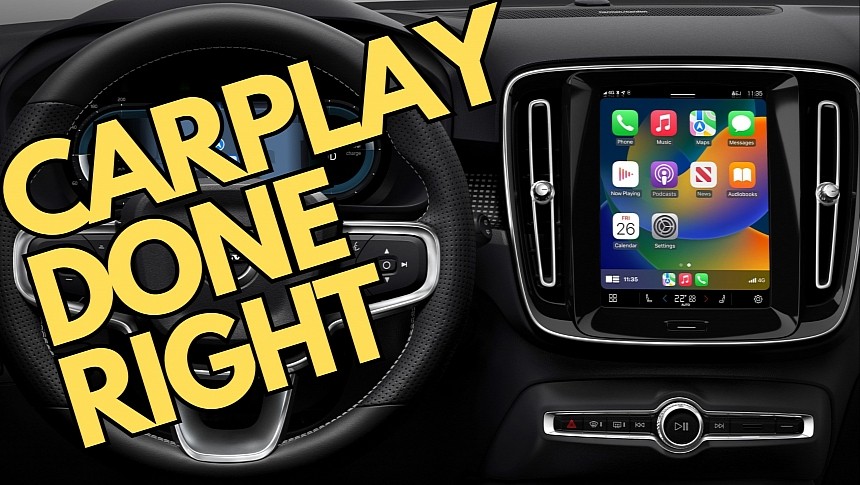The infotainment system has become a battlefield for carmakers, as most companies want to claim back control after previously giving it in to Google and Apple.
Android Auto and CarPlay have become the top choices in the majority of cars, but as the world is moving to a subscription-based model, carmakers believe the infotainment system could become a money-making machine.
It all culminated with General Motors moving to Android Automotive and blocking CarPlay and Android Auto in its cars despite the system supporting the phone projection software. Android Auto and CarPlay can run on top of Android Automotive if the carmakers allow them.
General Motors offers Android Automotive as the exclusive option in its EVs, but Volvo CEO Jim Rowan believes this isn't the right approach.
Speaking in a recent interview, Rowan explained that giving customers the power of choice is critical. It's why Volvo allows them to choose between the native infotainment system, Android Auto, and CarPlay.
Volvo also adopted Android Automotive, but unlike General Motors, it also allows drivers to connect their mobile devices to the head unit and run Android Auto and CarPlay.
Rowan admits that Apple and Google developed great software that won the infotainment war, so investing in alternative solutions that would eventually create more frustration in the customer base isn't the right approach. "I think you've got to pick your battles," he said, adding that most people are permanently connected to their smartphones, so forcing them to leave the mobile device behind when driving is wrong.
Rowan also emphasized that investing in technology to compete against solutions from Google and Apple makes no sense. It's why a digital assistant isn't part of Volvo's long-term strategy, as Rowan admits that the "7 billion people on the plane have an iPhone or an Android," and these mobile devices already come with a digital assistant.
It's not the right way to "spend your engineering dollars," Rowan explains, so letting Apple and Google do what they know best is the right approach.
Meanwhile, General Motors seems to think otherwise. The American carmaker expressed no intention to undo its decision, and starting with the 2024 Blazer EV, all its new electric vehicles will come with Android Automotive and without Android Auto and CarPlay.
The strategy has already backfired, as customers threatened to change brands if their next GM car doesn't have Android Auto and CarPlay. The carmaker promises a significantly upgraded experience with Android Automotive, emphasizing that the deeper integration into the vehicle allows features not otherwise available on Android Auto and CarPlay.
Android Automotive can read more vehicle data, allowing its services to offer advanced functionality. Google Maps has access to battery information, suggesting charging stops along the route. Google Assistant offers more voice commands than in an Android Auto vehicle, including support for adjusting the climate control settings.
It all culminated with General Motors moving to Android Automotive and blocking CarPlay and Android Auto in its cars despite the system supporting the phone projection software. Android Auto and CarPlay can run on top of Android Automotive if the carmakers allow them.
General Motors offers Android Automotive as the exclusive option in its EVs, but Volvo CEO Jim Rowan believes this isn't the right approach.
Speaking in a recent interview, Rowan explained that giving customers the power of choice is critical. It's why Volvo allows them to choose between the native infotainment system, Android Auto, and CarPlay.
Volvo also adopted Android Automotive, but unlike General Motors, it also allows drivers to connect their mobile devices to the head unit and run Android Auto and CarPlay.
Rowan admits that Apple and Google developed great software that won the infotainment war, so investing in alternative solutions that would eventually create more frustration in the customer base isn't the right approach. "I think you've got to pick your battles," he said, adding that most people are permanently connected to their smartphones, so forcing them to leave the mobile device behind when driving is wrong.
Rowan also emphasized that investing in technology to compete against solutions from Google and Apple makes no sense. It's why a digital assistant isn't part of Volvo's long-term strategy, as Rowan admits that the "7 billion people on the plane have an iPhone or an Android," and these mobile devices already come with a digital assistant.
It's not the right way to "spend your engineering dollars," Rowan explains, so letting Apple and Google do what they know best is the right approach.
Meanwhile, General Motors seems to think otherwise. The American carmaker expressed no intention to undo its decision, and starting with the 2024 Blazer EV, all its new electric vehicles will come with Android Automotive and without Android Auto and CarPlay.
The strategy has already backfired, as customers threatened to change brands if their next GM car doesn't have Android Auto and CarPlay. The carmaker promises a significantly upgraded experience with Android Automotive, emphasizing that the deeper integration into the vehicle allows features not otherwise available on Android Auto and CarPlay.
Android Automotive can read more vehicle data, allowing its services to offer advanced functionality. Google Maps has access to battery information, suggesting charging stops along the route. Google Assistant offers more voice commands than in an Android Auto vehicle, including support for adjusting the climate control settings.








